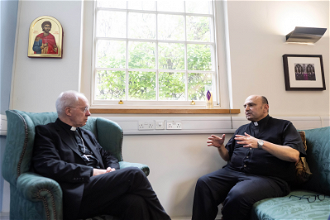Reflection: Fundamentalism isn't Muslim

The word 'fundamentalism' isn't a Muslim word, though now, in the press, it almost always refers to a type of Islam (or Muslim). It's a Christian word, first used in the early 1900s, when there was an increasing attack on traditional biblical teachings by science and rationalism. The word described a specific Christianity that returned to the texts and read them and their meaning them in a more particular but often very literal way. But the word fundamentalist is less frequently used for that historical moment and more often for a particular expression of Islam.
In terms of Islam and fundamentalism, some believe that Islam is inseparably connected with violence (an opinion fueled by the media), while others believe that violence is un-Islamic (a fact which ignores that Islam does allow for the use of violence under certain conditions). There are some in Islam who endorse violence. Under what conditions? That's the real problem. A real handicap for worldwide Islam is that there is no single Islamic figure or body that can definitively declare on whether violence can be used in a particular situation, or not. The possibility of a 'holy war', violence legitimized by religion, isn't something new. It was already being worked out by St Thomas Aquinas in the medieval period, with all its specific conditions. Catholic Christianity, following Aquinas, believes that warfare could be justified under very specific conditions, as a last resort. But whereas in Catholic Christianity there is a central authority to interpret and enforce the conditions, Islam lacks such a body. It's one of the reasons we are witnessing such massive disagreements among Muslims over current issues, as well as serious Muslim-on-Muslim violence.
There are other reasons too: my friend Imam Rashied Omar regularly points out that all sacred texts display the 'ambivalence of the sacred' and can be read in such a way as to justify violence. The meaning of the text is often as moral as the reader. If the reader is violent, so will be the interpretation of the text. Here's a simple definition of fundamentalism: when you are reading an ancient religious text, there are three steps. You read it then you interpret the meaning, then you live it. If you miss the second step, moving directly from reading to living out, you hit fundamentalism. Skipping the interpretation is part of religious fundamentalism. Another is the inability to differentiate between what God meant for a particular moment in history, in a localised place, and what he meant to be done forever, through every generation, and perhaps universally. There are exhortations to violence in the Qur'an (as in the Old Testament). That's not the issue. Nascent Islam met much violent opposition. The issue is: were those universal commands for all time, or local commands for a specific period of time? On that issue, the scholars of Islam seem unable to disagree.
In the last twenty years there has been a steady rise in angry religious groups and individuals who sometimes resort to violence, either physical or verbal. This religious anger is caused by a number of elements: mostly a sense of failure or defeat by religious people in an increasingly materialistic and atheistic society. This sense of defeat leads some to believe that they are under 'attack' and must defend their values against society, even using violence if this is necessary.
Fr Clohessy is an Islamic Scholar and Parish Priest of St Bernard's in Cape Town, South Africa
Follow the Jesuit Institute on Twitter @JesuitInstitute


















